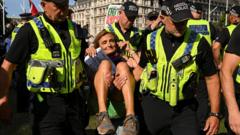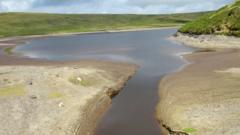What’s Next for the Palestine Action Ban After the Mass Arrests?

The Complex Dynamics of the Palestine Action Ban: Legal, Social, and Political Implications
The recent sit-in protest in Parliament Square surrounding the banned group Palestine Action has sparked a heated debate, not just about the organization itself but also about the implications of such a ban on civil liberties, public sentiment, and law enforcement. With over 700 demonstrators arrested since July and many of them being elderly citizens, the situation raises questions about the nature of activism, the legal system's response to dissent, and the broader implications for free speech in the UK. This article aims to delve into these facets, exploring how the legal battles ahead will shape public perception and the future of Palestine Action.
The Arrests and Their Significance
Protests are a quintessential element of democratic societies, serving as a platform for individuals to voice their concerns and advocate for change. However, the mass arrests of over 700 individuals, including a significant number of elderly protesters, during the demonstrations supporting Palestine Action raises crucial questions about the intersection of activism and law enforcement. The average age of those arrested was reported to be 54, with 112 individuals over the age of 70. This demographic not only highlights the diverse nature of the protest but also underscores the complexities involved in policing such events.
Many of these protesters are seasoned activists, some having transitioned from climate change advocacy to opposing the ban on Palestine Action. They argue that the ban infringes upon their rights to free speech and assembly. The discomfort experienced by law enforcement officers, as noted by solicitor Katie McFadden, adds another layer to this unfolding narrative. Police officers, who typically view themselves as protectors of the public, found themselves in situations they deemed morally ambiguous. This discomfort may lead to broader discussions about the ethics of enforcing laws perceived as infringing on civil liberties.
The Legal Battles Ahead
The future of Palestine Action and the implications of the ban will largely hinge on three pivotal courtroom battles. The first of these revolves around the arrests made in connection with the protests. Police must navigate the tricky terrain of deciding how many individuals to charge with supporting a banned terrorist organization while balancing public perception. The outcome of these legal proceedings could either reinforce or challenge the narrative surrounding Palestine Action.
Public Perception and the Role of Media
As the legal battles unfold, public perception will play a crucial role in shaping the future of Palestine Action. The organizers of the protests are keenly aware of the potential for sympathy among the public, which they hope to harness in their favor. By organizing additional demonstrations, they aim to create a groundswell of support that could pressure the government to reconsider the ban. This strategy hinges on the idea that visible, large-scale protests will resonate with a public that values free speech and civil liberties.
The Impact of Historical Context
To fully understand the implications of the ban on Palestine Action, it is essential to consider the historical context of terrorism laws in the UK. The legal definition of terrorism is broad, encompassing not just acts of violence but also serious criminal damage. This broad definition has evolved in response to past threats, such as those posed by the IRA in the 1990s, and is now being applied to groups like Palestine Action. This evolution raises questions about the proportionality of the ban and whether it truly reflects the organization's activities.
The Role of Legal Experts and Civil Liberties Advocates
Legal experts and civil liberties advocates are closely monitoring the situation, as the implications of the ban extend beyond Palestine Action itself. The High Court will soon determine whether the Home Secretary's decision to ban the group was a rational and proportionate response to its activities. This scrutiny is essential, as the outcome will not only affect the future of Palestine Action but could also set a precedent for how similar cases are handled in the future.
International Perspectives and Human Rights Considerations
International human rights organizations, including the United Nations, have begun to weigh in on the situation. The involvement of figures like Volker Turk, the UN human rights chief, signals that the implications of the ban could reach far beyond UK borders. The assertion that the ban places the UK outside international law highlights the potential consequences of governmental actions that infringe upon the rights to protest and free speech.
The Potential Outcomes of the Legal Battles
As the legal battles progress, several outcomes are possible. If the High Court rules in favor of Palestine Action, it could lead to the collapse of cases against those arrested, effectively nullifying the arrests and potentially galvanizing further activism. Conversely, if the ban is upheld, the government may gain an upper hand, allowing for continued arrests and charges against activists.
Looking Ahead: The Future of Palestine Action
The future of Palestine Action remains uncertain, heavily influenced by the legal challenges ahead. Activists within the organization are prepared to continue their fight, armed with a belief in their cause and a commitment to free speech. However, the government's position is fortified by the legal framework that allows for the banning of organizations deemed a threat to public safety. This tug-of-war encapsulates the broader struggle between state power and civil liberties, and how this dynamic will evolve remains to be seen.
FAQs
What led to the ban on Palestine Action in the UK?
The ban on Palestine Action was enacted following allegations of the group's involvement in violent activities and significant criminal damage. The government's assessment indicated that their actions constituted threats to public safety, leading to the designation as a terrorist organization.
How many protesters were arrested during the demonstrations?
As of now, over 700 protesters have been arrested since July, with many of them being elderly individuals. This statistic highlights the diverse demographic of those actively opposing the ban.
What are the potential legal outcomes of the ongoing court cases?
The legal outcomes could range from the High Court overturning the ban, which would nullify cases against the arrested protesters, to upholding the ban, allowing the government to continue its legal actions against Palestine Action supporters.
How does the ban on Palestine Action impact free speech in the UK?
The ban raises significant concerns about the implications for free speech in the UK, as it challenges the rights of individuals to protest and voice dissenting opinions. The legal battles will further clarify how these rights are interpreted in the context of national security.
What role does public perception play in the Palestine Action protests?
Public perception is crucial in shaping the future of Palestine Action. The organizers aim to garner sympathy from the public, believing that large-scale protests can pressure the government to reconsider the ban.
The legal and social ramifications of the Palestine Action ban continue to unfold, shaping the narrative surrounding free speech and civil liberties in the UK. As these courtroom battles commence, the outcomes will not only determine the fate of Palestine Action but could also redefine the boundaries of activism and dissent in a democratic society. How far will you go to defend the right to protest? #PalestineAction #FreeSpeech #CivilLiberties
Published: 2025-08-13 23:07:05 | Category: technology



